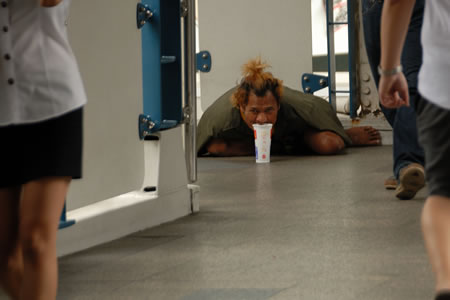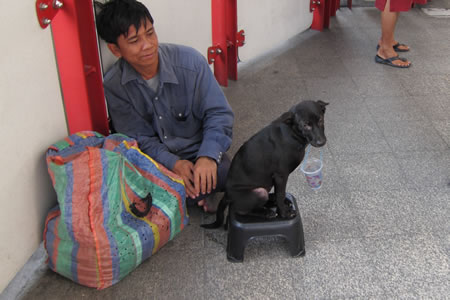English | Dutch |
|
| Beggars also need skills | |
Bangkok (Thailand), February 1st 2012
|
|
| |
|
Beggars deserve respect, just as every other living being – except the mosquito perhaps. We can still vividly remember the time that we saw Indian schoolchildren throwing stones at an older beggar. Giving money or not, is a personal choice. For ourselves, we have one strict guideline: we never give to children or beggars who take children to their “job”. Children who look like they haven’t seen water and soap in years have the ability to win your heart. But when they earn few Euros a day as a beggar, this is enough reason for their parents to send them onto the streets instead of sending them to school; with all the negative consequences that this has. Handicapped persons seem a safer destination for the Euros you would like to donate. In countries where disability pensions don’t exist, they have to be fed by their family and every bit of income that they can gather themselves to add to the family income seems welcome. However, giving to the disabled people also has negative aspects. In countries like India, there are people who amputate limbs to be able to generate more alms. It’s incredible that people can do this to themselves, but it is an act of complete cruelty when men press-gang street-children and mutilate them to enhance their begging potential. |
|
 |
|
A beggar-actor near the MBK shopping mall in Bangkok |
|
At the moment, we are in Thailand, where it seems less cruel. Here, beggars sometimes fake a disability. After several visits to the Thai capital, we are finally getting to know the actors in the surroundings of the MBK shopping mall. The man with his blond dyed hair looks like he is folded in two. His legs lie underneath his bottom and his torso lies on the pavement. Between his teeth, he holds a cup of Mc Donald’s while he looks at the passers-by beseechingly. However, when you come here often enough, you will also see him during one of his breaks or when he is just installing himself for work. While performing his act, it looks like he doesn’t have arms (he hides them underneath his blouse) and he is partly paralyzed; but when he is on a break his arms miraculously appear and he just walks to another beggar who is also always there. This guy really misses his under leg and he has an artificial leg which he uses to get to work everyday. When he installs himself for a day of begging, he removes his prosthesis and hides it in a bag and shows his cut-off leg. Does this mean that these people shouldn’t get any alms? Again, a difficult question that we can’t answer. Persons, who spend their lives folded on the pavement, can’t be envied in any way. The feeling of compassion seems praiseworthy, but it also is difficult to swallow that you try to give your money to the person who needs it most, while there are probably also persons with an amputated leg who don’t have prosthesis. | |
 |
|
Smart, smarter, smartest: use a dog to increase the beggar income |
|
| In the competition for alms, the strategy is normally to look as pathetic as possible. Today, however, another strategy was the winning one. On the spot where previously a blind man was singing, a little dog was sitting with his boss on the background. The dog was holding a cup in his mouth and was begging like only a dog can beg. Coins were pouring in, so it is a matter of time until this strategy is copied. As a donator, you should probably not think too much and just feel happy that you “tried” to do a good deed. Nobody spends his time on the pavement because this is his dream job and everybody can use the money. Still, we try to make choices that don’t stimulate bad habits. Children should go to school, so we don’t give to them. In India we won’t give to handicapped beggars, because we don’t want to stimulate crimps to mutilate even more people. The most important thing that we do, however, is to spend money at local entrepreneurs. In Kuala Lumpur we buy nice little souvenirs that were made by two disabled persons who sell their merchandise in a small street stall; they don’t beg, but they work. They live like the Cambodian bookseller that we met a few years earlier. She was waking long days on an artificial leg and was carrying a huge pile of books, that she tried to sell. When we bought a book, she told us she didn’t need any pity and that she was proud that she was having a job instead of being a beggar.
By supporting small, local enterprises, the poor have a chance to “earn” a living instead of “getting” one. It is normal that their goods are a bit more expensive than when you go to the supermarket, but there are boundaries. For us, the maximum is the amount that local middle class is willing to pay. Sellers who only try to sell stuff to the small minority of western tourists are normally not the people who will receive our money. When they only see us as brainless, walking ATM’s, we are normally not in the mood to buy. In the end: respect has to come from two sides.
| |